List of Prime Ministers of the United Kingdom
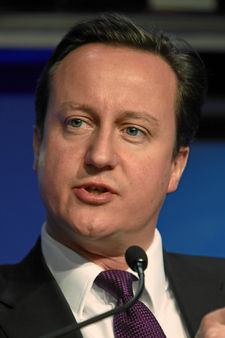
The Prime Minister of the United Kingdom of Great Britain and Northern Ireland is the political leader of the United Kingdom and the Head of Her Majesty's Government. The office holder is responsible for nominating all other members of the government, chairing Cabinet meetings and deciding when to call a new general election for the House of Commons.[1][2] The Prime Minister can also make nominations to senior positions in the Church of England, nominate judges and propose the creation of new life peers.[3]
There is no specific date when the office of Prime Minister first appeared, as the role was not created but evolved over a period of time.[4] However, modern historians generally apply the title of First Prime Minister to Sir Robert Walpole, who led Great Britain for 21 years from 1721 to 1742.[5][6] As of 2010[update], Walpole is the longest serving Prime Minister of the country.[7]
Colour key
(for political parties)
Whig Tory Conservative Peelite/Whig Liberal Labour National Labour
Prime Ministers under George I (1714–1727) and George II (1727–1760)
| Portrait | Name (Birth–Death) Constituency/Title |
Term of office — Electoral mandates |
Other ministerial offices held while Prime Minister |
Political party of PM |
Government | Refs | ||
|---|---|---|---|---|---|---|---|---|
 |
Sir Robert Walpole (1676–1745) MP for King's Lynn until 1742 Earl of Orford from 1742 |
4 April 1721 |
11 February 1742 |
First Lord of the Treasury, Chancellor of the Exchequer & Leader of the House of Commons |
Whig (Walpole/Townshend 1721–30; Walpole Ministry 1730–42) |
[5][7] | ||
| 1722, 1727, 1734, 1741 | ||||||||
| Regarded as the first Prime Minister in the modern sense; The South Sea Company bubble; criticised for Great Britain's poor performance in the War of Jenkins' Ear. | ||||||||
 |
Spencer Compton, 1st Earl of Wilmington (1673–1743) |
16 February 1742 |
2 July 1743 |
First Lord of the Treasury | Whig | Carteret | [8] | |
| — | ||||||||
| Increased tax on spirits; in poor health for much of his time as Prime Minister, the government was led de facto by John Carteret. Died in office. | ||||||||
 |
Henry Pelham (1694–1754) MP for Sussex |
27 August 1743 |
6 March 1754 |
First Lord of the Treasury, Chancellor of the Exchequer & Leader of the House of Commons |
Whig (Carteret Ministry 1743–44; Broad Bottom Ministry 1744–54) |
[9] | ||
| 1747 | ||||||||
| Reorganisation of the Royal Navy; 1745 Jacobite Rebellion; adoption of the Gregorian Calendar; Marriage Act 1753; helped end the War of the Austrian Succession. Died in office. | ||||||||
 |
Thomas Pelham-Holles, 1st Duke of Newcastle (1693–1768) |
16 March 1754 |
16 November 1756 |
First Lord of the Treasury & Leader of the House of Lords |
Whig | Newcastle I | [8] | |
| 1754 | ||||||||
| Led Great Britain into the Seven Years' War with France in North America. | ||||||||
| William Cavendish, 4th Duke of Devonshire (1720–1764) |
16 November 1756 |
25 June 1757 |
First Lord of the Treasury & Leader of the House of Lords |
Whig (Devonshire-Pitt Ministry; 1757 Caretaker Ministry) |
[8] | |||
| — | ||||||||
| The government was largely run by William Pitt the Elder. | ||||||||
 |
Thomas Pelham-Holles, 1st Duke of Newcastle (1693–1768) |
2 July 1757 |
26 May 1762 |
First Lord of the Treasury & Leader of the House of Lords |
Whig | Newcastle II | [8] | |
| 1761 | ||||||||
| Great Britain gained more influence abroad in the Seven Years' War; the war was largely prosecuted by Pitt the Elder as Secretary of State. | ||||||||
Prime Ministers under George III (1760–1820)
| Portrait | Name (Birth–Death) Constituency/Title |
Term of office — Electoral mandates |
Other ministerial offices held while Prime Minister |
Political party of PM |
Government | Refs | ||
|---|---|---|---|---|---|---|---|---|
 |
John Stuart, 3rd Earl of Bute (1713–1792) |
26 May 1762 |
8 April 1763 |
First Lord of the Treasury & Leader of the House of Lords |
Tory | Bute | [10] | |
| — | ||||||||
| First Scottish Prime Minister. Ended the dominance of the Whigs; Treaty of Paris (1763) ending the Seven Years' War; resigned after fierce criticism of Treaty of Paris concessions. | ||||||||
 |
George Grenville (1712–1770) MP for Buckingham |
16 April 1763 |
13 July 1765 |
First Lord of the Treasury, Chancellor of the Exchequer & Leader of the House of Commons |
Whig (Grenvillite) | Grenville | [11] | |
| — | ||||||||
| Lowered domestic tax at the expense of the colonies; introduced the Stamp Act 1765 (which ultimately led to the American Revolution). | ||||||||
 |
Charles Watson-Wentworth, 2nd Marquess of Rockingham (1730–1782) |
13 July 1765 |
30 July 1766 |
First Lord of the Treasury & Leader of the House of Lords |
Whig (Rockingham) | Rockingham I | [12] | |
| — | ||||||||
| Repealed the controversial Stamp Act, inspired by protests from both American colonists and British manufacturers who were hurt by it; introduced the Declaratory Act 1766. | ||||||||
 |
William Pitt the Elder, 1st Earl of Chatham (1708–1778) |
30 July 1766 |
14 October 1768 |
Lord Privy Seal | Whig (Chathamite) | Chatham | [13] | |
| — | ||||||||
| The first real Imperialist; credited with the birth of the British Empire; defeated France in Canada, thereby indirectly precipitating the French Revolution. | ||||||||
| Augustus FitzRoy, 3rd Duke of Grafton (1735–1811) |
14 October 1768 |
28 January 1770 |
First Lord of the Treasury & Leader of the House of Lords |
Whig (Chathamite) | Grafton | [14] | ||
| 1768 | ||||||||
| Attempted to reconcile with the American colonies. | ||||||||
 |
Frederick North, Lord North (1732–1792) MP for Banbury |
28 January 1770 |
22 March 1782 |
First Lord of the Treasury, Chancellor of the Exchequer & Leader of the House of Commons |
Tory | North | [15] | |
| 1774, 1780 | ||||||||
| Led Great Britain into the American Revolution, making a number of tactical errors; the Gordon Riots; attempted reform in Ireland; resigned after a vote of no confidence against the will of the King. | ||||||||
 |
Charles Watson-Wentworth, 2nd Marquess of Rockingham (1730–1782) |
27 March 1782 |
1 July 1782 |
First Lord of the Treasury & Leader of the House of Lords |
Whig (Rockingham) | Rockingham II | [8] | |
| — | ||||||||
| Acknowledged the independence of the United States; began a process of economic reform. Died in office. | ||||||||
 |
William Petty-FitzMaurice, 2nd Earl of Shelburne (1737–1805) |
4 July 1782 |
2 April 1783 |
First Lord of the Treasury & Leader of the House of Lords |
Whig (Chathamite) | Shelburne | [8] | |
| — | ||||||||
| Planned political reform; secured peace with the United States, France and Spain. | ||||||||
 |
William Cavendish-Bentinck, 3rd Duke of Portland (1738–1809) |
2 April 1783 |
19 December 1783 |
First Lord of the Treasury & Leader of the House of Lords |
Whig | Fox-North Coalition | [8] | |
| — | ||||||||
| Titular head of the Fox-North Coalition. Attempted to reform the British East India Company, but was blocked by George III. | ||||||||
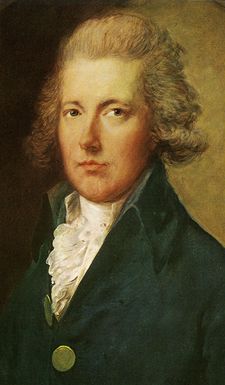 |
William Pitt the Younger (1759–1806) MP for Appleby until 1784 MP for Cambridge University from 1784 |
19 December 1783 |
14 March 1801 |
First Lord of the Treasury, Chancellor of the Exchequer & Leader of the House of Commons |
Tory (Pittite) | Pitt the Younger I | [16] | |
| 1784, 1790, 1796 | ||||||||
| Youngest Prime Minister. India Act 1784; attempted to remove rotten boroughs; personally opposed to the slave trade; reduced the national debt due to the rebellion in the North American colonies; formed the Triple Alliance; Constitutional Act of 1791; war with France starting in 1793; Cape Colony (South Africa) taken 1795; introduced the first income tax; Act of Union 1800. | ||||||||
 |
Henry Addington (1757–1844) MP for Devizes |
17 March 1801 |
10 May 1804 |
First Lord of the Treasury, Chancellor of the Exchequer & Leader of the House of Commons |
Tory (Pittite) | Addington | [8] | |
| 1801 co-option, 1802 | ||||||||
| Negotiated the Treaty of Amiens with France in 1802. | ||||||||
 |
William Pitt the Younger (1759–1806) MP for Cambridge University |
10 May 1804 |
23 January 1806 |
First Lord of the Treasury, Chancellor of the Exchequer & Leader of the House of Commons |
Tory (Pittite) | Pitt the Younger II | [8] | |
| — | ||||||||
| Alliance with Russia, Austria and Sweden against France (Third Coalition); Battle of Trafalgar; Battle of Ulm; Battle of Austerlitz. Died in office. | ||||||||
 |
William Wyndham Grenville, 1st Lord Grenville (1759–1834) |
11 February 1806 |
31 March 1807 |
First Lord of the Treasury & Leader of the House of Lords |
Whig | Ministry of All the Talents | [8] | |
| 1806 | ||||||||
| Abolition of the slave trade. | ||||||||
 |
William Cavendish-Bentinck, 3rd Duke of Portland (1738–1809) |
31 March 1807 |
4 October 1809 |
First Lord of the Treasury | nominally Tory | Portland II | [8] | |
| 1807 | ||||||||
| He headed a Tory government; was old and ill, leaving the Cabinet to their own devices (largely headed by Spencer Perceval). | ||||||||
 |
Spencer Perceval (1762–1812) MP for Northampton |
4 October 1809 |
11 May 1812 |
First Lord of the Treasury, Chancellor of the Exchequer, Chancellor of the Duchy of Lancaster & Leader of the House of Commons |
Tory | Perceval | [17] | |
| — | ||||||||
| Descent of George III into madness; his administration was notable for the lack of senior statesmen (Perceval also served as the Chancellor of the Exchequer); Peninsular War, part of the Napoleonic Wars. The only Prime Minister to have been assassinated. | ||||||||
 |
Robert Banks Jenkinson, 2nd Earl of Liverpool (1770–1828) |
8 June 1812 |
9 April 1827 |
First Lord of the Treasury & Leader of the House of Lords |
Tory | Liverpool | [18] | |
| 1812, 1818, 1820, 1826 | ||||||||
| Oversaw the United Kingdom's victory in the Napoleonic Wars; the Congress of Vienna; an economic recession in 1817; the Luddite movement; The War of 1812 (in Britain, the American War of 1812 to 1815); Peterloo Massacre in 1819; return to the gold standard in 1819; the Cato Street Conspiracy to assassinate Liverpool in 1820. | ||||||||
Prime Ministers under George IV (1820–1830)
| Portrait | Name (Birth–Death) Constituency/Title |
Term of office — Electoral mandates |
Other ministerial offices held while Prime Minister |
Political party of PM |
Government | Refs | ||
|---|---|---|---|---|---|---|---|---|
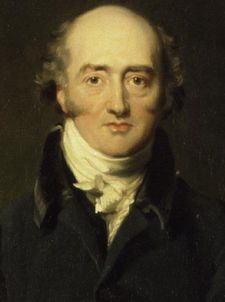 |
George Canning (1770–1827) MP for Seaham |
10 April 1827 |
8 August 1827 |
First Lord of the Treasury, Chancellor of the Exchequer & Leader of the House of Commons |
Tory (Canningite) | Canning | [8] | |
| — | ||||||||
| Died shortly after taking office. | ||||||||
 |
Frederick John Robinson, 1st Viscount Goderich (1782–1859) |
31 August 1827 |
21 January 1828 |
First Lord of the Treasury & Leader of the House of Lords |
Tory (Canningite) | Goderich | [8] | |
| — | ||||||||
| Lacked support amongst colleagues; resigned. | ||||||||
 |
Arthur Wellesley, 1st Duke of Wellington (1769–1852) |
22 January 1828 |
16 November 1830 |
First Lord of the Treasury & Leader of the House of Lords |
Tory | Wellington | [8] | |
| 1830 | ||||||||
| Catholic Emancipation Bill (over which he fought a duel). | ||||||||
Prime Ministers under William IV (1830–1837)
| Portrait | Name (Birth–Death) Constituency/Title |
Term of office — Electoral mandates |
Other ministerial offices held while Prime Minister |
Political party of PM |
Government | Refs | ||
|---|---|---|---|---|---|---|---|---|
 |
Charles Grey, 2nd Earl Grey (1764–1845) |
22 November 1830 |
9 July 1834 |
First Lord of the Treasury & Leader of the House of Lords |
Whig | Grey | [19] | |
| 1831, 1832 | ||||||||
| Reform Act 1832; quelled Swing Riots; restriction of employment of children; reform of the Poor Laws; abolition of slavery throughout the British Empire. | ||||||||
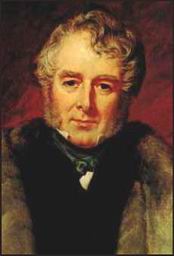 |
William Lamb, 2nd Viscount Melbourne (1779–1848) |
16 July 1834 |
14 November 1834 |
First Lord of the Treasury & Leader of the House of Lords |
Whig | Melbourne I | [20] | |
| — | ||||||||
| William IV's opposition forced him to resign. | ||||||||
 |
Arthur Wellesley, 1st Duke of Wellington (1769–1852) |
14 November 1834 |
10 December 1834 |
First Lord of the Treasury, Secretary of State for the Home Department, Secretary of State for Foreign Affairs, Secretary of State for War and the Colonies & Leader of the House of Lords |
Tory | Conservative Provisional | [21] | |
| — | ||||||||
| Caretaker government while Sir Robert Peel was located and returned to London. Held many of the major posts himself. | ||||||||
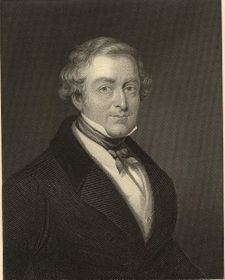 |
Sir Robert Peel (1788–1850) MP for Tamworth |
10 December 1834 |
8 April 1835 |
First Lord of the Treasury, Chancellor of the Exchequer & Leader of the House of Commons |
Conservative | Peel I | [22][23] | |
| 1835† | ||||||||
| †Minority government. Unable to form a majority in Parliament so resigned. | ||||||||
 |
William Lamb, 2nd Viscount Melbourne (1779–1848) |
18 April 1835 |
30 August 1841 |
First Lord of the Treasury & Leader of the House of Lords |
Whig | Melbourne II | [24] | |
| 1835, 1837 | ||||||||
| A father figure to Queen Victoria; Municipal Corporations Act 1835; Bedchamber Crisis; Treaty of Waitangi. | ||||||||
Prime Ministers under Victoria (1837–1901)
| Portrait | Name (Birth–Death) Constituency/Title |
Term of office — Electoral mandates |
Other ministerial offices held while Prime Minister |
Political party of PM |
Government | Refs | ||
|---|---|---|---|---|---|---|---|---|
 |
Sir Robert Peel (1788–1850) MP for Tamworth |
30 August 1841 |
29 June 1846 |
First Lord of the Treasury & Leader of the House of Commons |
Conservative | Peel II | [25] | |
| 1841 | ||||||||
| Mines Act 1842; reintroduction of income tax; Factory Act 1844; Railway Regulation Act 1844; repeal of the Corn Laws (triggered by the Great Irish Potato Famine) and other tariffs; Maynooth Grant. | ||||||||
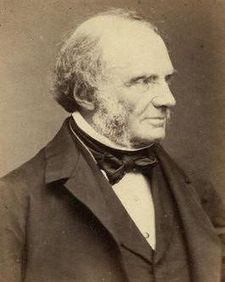 |
Lord John Russell (1792–1878) MP for City of London |
30 June 1846 |
21 February 1852 |
First Lord of the Treasury & Leader of the House of Commons |
Whig | Russell I | [26] | |
| 1847† | ||||||||
| †Minority government, but with the Conservatives split between Protectionists and Peelites, the Whigs held power. Education Act 1847; Don Pacifico affair; Chartist demonstrations; Australian Colonies Government Act; The Great Exhibition; improved the Poor laws. | ||||||||
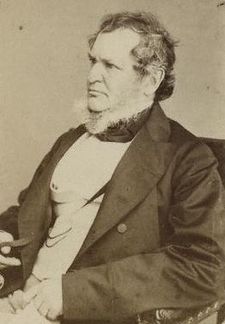 |
Edward Smith-Stanley, 14th Earl of Derby (1799–1869) |
23 February 1852 |
17 December 1852 |
First Lord of the Treasury & Leader of the House of Lords |
Conservative | Derby I | [27] | |
| 1852 | ||||||||
| Government collapsed when his Chancellor's Budget was defeated. | ||||||||
 |
George Hamilton-Gordon, 4th Earl of Aberdeen (1784–1860) |
19 December 1852 |
30 January 1855 |
First Lord of the Treasury & Leader of the House of Lords |
Peelite | Aberdeen | [28] | |
| — | ||||||||
| Led the country into the Crimean War; resigned after defeat in the vote for an inquiry into the conduct of the war. | ||||||||
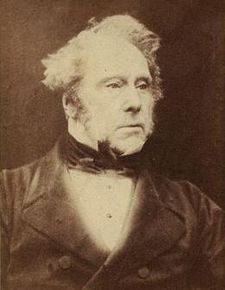 |
Henry John Temple, 3rd Viscount Palmerston (1784–1865) MP for Tiverton |
6 February 1855 |
19 February 1858 |
First Lord of the Treasury & Leader of the House of Commons |
Whig | Palmerston I | [29] | |
| 1857 | ||||||||
| Responded to the Indian mutiny of 1857; introduced the India Bill. | ||||||||
 |
Edward Smith-Stanley, 14th Earl of Derby (1799–1869) |
20 February 1858 |
11 June 1859 |
First Lord of the Treasury & Leader of the House of Lords |
Conservative | Derby II | [30] | |
| — | ||||||||
| Government of India Act 1858, transferring ownership of the East India Company to the Crown; Jews Relief Act, allowing Jews to become MPs. | ||||||||
 |
Henry John Temple, 3rd Viscount Palmerston (1784–1865) MP for Tiverton |
12 June 1859 |
18 October 1865 |
First Lord of the Treasury & Leader of the House of Commons |
Liberal | Palmerston II | [31] | |
| 1859, 1865 | ||||||||
| Between periods in office he founded the Liberal Party; term dominated by policy concerning the American Civil War; attempts to alleviate suffering caused by the Lancashire Cotton Famine. Died in office. | ||||||||
 |
John Russell, 1st Earl Russell (1792–1878) |
29 October 1865 |
26 June 1866 |
First Lord of the Treasury & Leader of the House of Lords |
Liberal | Russell II | [32] | |
| — | ||||||||
| Attempted to introduce a further Reform Bill, but was opposed by his Cabinet. | ||||||||
 |
Edward Smith-Stanley, 14th Earl of Derby (1799–1869) |
28 June 1866 |
25 February 1868 |
First Lord of the Treasury & Leader of the House of Lords |
Conservative | Derby III | [33] | |
| — | ||||||||
| Reform Act 1867; considered by some to be the father of the modern Conservative Party. | ||||||||
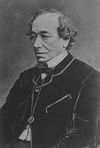 |
Benjamin Disraeli (1804–1881) MP for Buckinghamshire |
27 February 1868 |
1 December 1868 |
First Lord of the Treasury & Leader of the House of Commons |
Conservative | Disraeli I | [34] | |
| — | ||||||||
| Only ethnically Jewish Prime Minister; dissolved Parliament as the Conservatives did not have a majority. | ||||||||
 |
William Ewart Gladstone (1809–1898) MP for Greenwich |
3 December 1868 |
17 February 1874 |
First Lord of the Treasury, Leader of the House of Commons & Chancellor of the Exchequer (1873–74) |
Liberal | Gladstone I | [35] | |
| 1868 | ||||||||
| Introduced reforms to the British Army, Civil Service and local government; made peacetime flogging illegal; Irish Church Disestablishment Act 1869; Irish Land Act 1870; Education Act 1870; Trade Union Act 1871; Ballot Act 1872; Licensing Act 1872; failed to prevent the Franco-Prussian War. | ||||||||
 |
Benjamin Disraeli (1804–1881) MP for Buckinghamshire until 1876 Earl of Beaconsfield from 1876 |
20 February 1874 |
21 April 1880 |
First Lord of the Treasury, Leader of the House of Commons (1874–76), Lord Privy Seal (1876–78) & Leader of the House of Lords (1876–80) |
Conservative | Disraeli II | [36] | |
| 1874 | ||||||||
| Various social reforms including the Climbing Boys Act 1875, the Public Health Act 1875 and the Artisans' and Labourers' Dwellings Improvement Act 1875; purchase of shares in the Suez Canal Company; Congress of Berlin; reintroduction of Queen Victoria to public life, including bestowing the title Empress of India; Second Anglo-Afghan War; breaking up of the League of the Three Emperors; the Zulu War; start of Long Depression. | ||||||||
 |
William Ewart Gladstone (1809–1898) MP for Midlothian |
23 April 1880 |
9 June 1885 |
First Lord of the Treasury, Leader of the House of Commons & Chancellor of the Exchequer (1880–82) |
Liberal | Gladstone II | [37] | |
| 1880 | ||||||||
| First Boer War; Irish Coercion Act; Kilmainham Treaty; Phoenix Park Murders; Married Women's Property Act 1882; Corrupt and Illegal Practices Prevention Act 1883; Reform Act 1884, Redistribution of Seats Act 1885 (sometimes known collectively as the Third Reform Act); failure to rescue General Gordon in Khartoum, Sudan. | ||||||||
| Robert Gascoyne-Cecil, 3rd Marquess of Salisbury (1830–1903) |
23 June 1885 |
28 January 1886 |
Secretary of State for Foreign Affairs & Leader of the House of Lords |
Conservative | Salisbury I | [38] | ||
| 1885† | ||||||||
| †Minority government. Legislation providing for housing the working class. | ||||||||
 |
William Ewart Gladstone (1809–1898) MP for Midlothian |
1 February 1886 |
20 July 1886 |
First Lord of the Treasury, Lord Privy Seal & Leader of the House of Commons |
Liberal | Gladstone III | [39] | |
| 1885 | ||||||||
| First introduction of the Home Rule Bill for Ireland, which split the Liberal Party, resulting in the end of Gladstone's government. | ||||||||
| Robert Gascoyne-Cecil, 3rd Marquess of Salisbury (1830–1903) |
25 July 1886 |
11 August 1892 |
Leader of the House of Lords, First Lord of the Treasury (1886–87) & Secretary of State for Foreign Affairs (1887–92) |
Conservative | Salisbury II | [40] | ||
| 1886 | ||||||||
| Opposed Irish home rule; repeal of final Contagious Diseases Act; Local Government Act 1888; Partition of Africa; Free Education Act 1891; creation of Rhodesia (now Zimbabwe); New Unionism and London Dock Strike of 1889. | ||||||||
 |
William Ewart Gladstone (1809–1898) MP for Midlothian |
15 August 1892 |
2 March 1894 |
First Lord of the Treasury, Lord Privy Seal & Leader of the House of Commons |
Liberal | Gladstone IV | [41] | |
| 1892† | ||||||||
| †Minority government. Reintroduction of the Home Rule Bill, which was passed by the House of Commons but rejected by the House of Lords leading to his resignation. | ||||||||
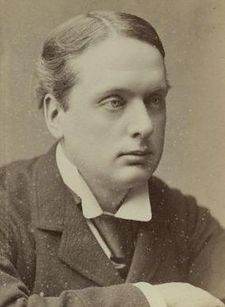 |
Archibald Primrose, 5th Earl of Rosebery (1847–1929) |
5 March 1894 |
22 June 1895 |
First Lord of the Treasury, Lord President of the Council & Leader of the House of Lords |
Liberal | Rosebery | [42] | |
| — | ||||||||
| Imperialist; plans for expanding the Royal Navy caused disagreement within the Liberal Party; resigned following a vote of censure over military supplies. | ||||||||
| Robert Gascoyne-Cecil, 3rd Marquess of Salisbury (1830–1903) |
25 June 1895 |
11 July 1902 |
Leader of the House of Lords, Secretary of State for Foreign Affairs (1895–1900) & Lord Privy Seal (1900–02) |
Conservative | Salisbury Unionist | [43] | ||
| 1895, 1900 | ||||||||
| Workmen's Compensation Act 1897; Anglo-Zanzibar War; Second Boer War and Khaki election; Anglo-Japanese Alliance. | ||||||||
Prime Ministers under Edward VII (1901–1910)
| Portrait | Name (Birth–Death) Constituency/Title |
Term of office — Electoral mandates |
Other ministerial offices held while Prime Minister |
Political party of PM |
Government | Refs | ||
|---|---|---|---|---|---|---|---|---|
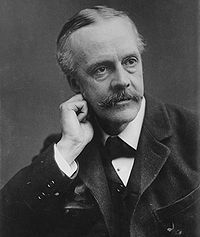 |
Arthur Balfour (1848–1930) MP for Manchester East |
11 July 1902 |
5 December 1905 |
First Lord of the Treasury & Leader of the House of Commons |
Conservative | Balfour Unionist | [8] | |
| — | ||||||||
| Had poor relations with Edward VII; his cabinet was split over free trade; establishment of the Committee of Imperial Defence; Entente Cordiale; Education Act 1902; Taff Vale case. | ||||||||
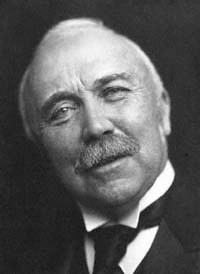 |
Sir Henry Campbell-Bannerman (1836–1908) MP for Stirling Burghs |
5 December 1905 |
7 April 1908 |
First Lord of the Treasury & Leader of the House of Commons |
Liberal | Campbell-Bannerman | [8] | |
| 1906 | ||||||||
| Restored autonomy to Transvaal and the Orange Free State; Anglo-Russian Entente; first Prime Minister to be referred to as such in Parliamentary legislation. | ||||||||
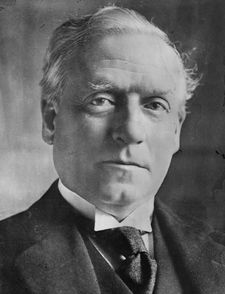 |
Herbert Henry Asquith (1852–1928) MP for East Fife |
7 April 1908 |
25 May 1915 |
First Lord of the Treasury, Leader of the House of Commons & Secretary of State for War (1914) |
Liberal | Asquith I | [8] | |
| Jan.1910†, Dec.1910† | ||||||||
| †Hung Parliaments. Liberal Welfare Reforms; People's Budget; Old Age Pensions Act 1908 and National Insurance Act 1911; Parliament Act 1911; Suffragettes and the Cat and Mouse Act; Home Rule Act 1914; World War I. | ||||||||
Prime Ministers under George V (1910–1936) and Edward VIII (1936)
| Portrait | Name (Birth–Death) Constituency/Title |
Term of office — Electoral mandates |
Other ministerial offices held while Prime Minister |
Political party of PM |
Government | Refs | ||
|---|---|---|---|---|---|---|---|---|
 |
Herbert Henry Asquith (1852–1928) MP for East Fife |
25 May 1915 |
7 December 1916 |
First Lord of the Treasury & Leader of the House of Commons |
Liberal | Coalition | [8] | |
| — | ||||||||
| Easter Rising. | ||||||||
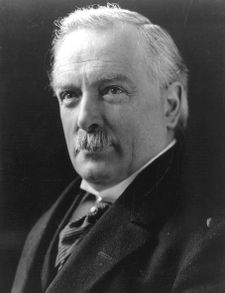 |
David Lloyd George (1863–1945) MP for Caernarvon Boroughs |
7 December 1916 |
19 October 1922 |
First Lord of the Treasury | Liberal | Coalition | [44] | |
| 1918 | ||||||||
| Welsh-speaking: only Prime Minister whose mother tongue was not English. End of World War I; Paris Peace Conference; attempted to extend conscription to Ireland during the First World War; granted women over 30 the vote; formation of the Irish Free State. | ||||||||
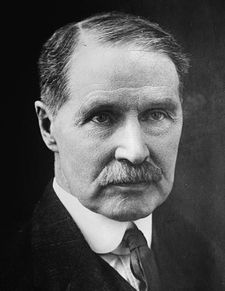 |
Andrew Bonar Law (1858–1923) MP for Glasgow Central |
23 October 1922 |
20 May 1923 |
First Lord of the Treasury & Leader of the House of Commons |
Conservative | Bonar Law | [45] | |
| 1922 | ||||||||
| Canadian-born: only Prime Minister born outside the British Isles. Resigned due to ill health; died six months after leaving office. | ||||||||
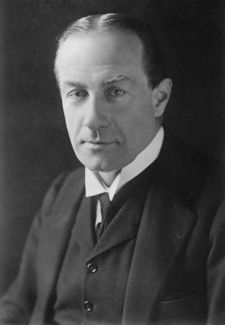 |
Stanley Baldwin (1867–1947) MP for Bewdley |
23 May 1923 |
16 January 1924 |
First Lord of the Treasury, Leader of the House of Commons & Chancellor of the Exchequer (1923) |
Conservative | Baldwin I | [46] | |
| — | ||||||||
| Called a general election to gain a mandate for protectionist tariffs but failed to gain a majority; resigned after losing a vote of confidence. | ||||||||
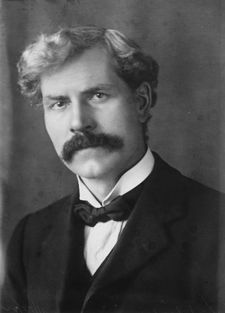 |
Ramsay MacDonald (1866–1937) MP for Aberavon |
22 January 1924 |
4 November 1924 |
First Lord of the Treasury, Leader of the House of Commons & Secretary of State for Foreign Affairs |
Labour | MacDonald I | [47] | |
| 1923† | ||||||||
| †Hung Parliament; minority government reliant on Liberal support. First Labour Prime Minister; did not have a majority so could not introduce radical legislation; settled reparations with Germany following World War I; Zinoviev letter. | ||||||||
 |
Stanley Baldwin (1867–1947) MP for Bewdley |
4 November 1924 |
5 June 1929 |
First Lord of the Treasury & Leader of the House of Commons |
Conservative | Baldwin II | [48] | |
| 1924 | ||||||||
| Treaty of Locarno; signatory of the Kellogg-Briand Pact; Pensions Act; enfranchisement of women over 21; UK General Strike of 1926. | ||||||||
 |
Ramsay MacDonald (1866–1937) MP for Seaham |
5 June 1929 |
24 August 1931 |
First Lord of the Treasury & Leader of the House of Commons |
Labour | MacDonald II | [49] | |
| 1929† | ||||||||
| †Hung Parliament. Appointed the first female minister, Margaret Bondfield; economic crises following the Wall Street Crash of 1929. | ||||||||
| 24 August 1931 |
7 June 1935 |
First Lord of the Treasury & Leader of the House of Commons |
National Labour | [[First National Government 1931|1 National]]; [[Second National Government 1931–1935|2 National]] |
[50] | |||
| 1931 | ||||||||
| Unable to retain the support of the Labour Party, MacDonald officially resigned and was then re-appointed to form a National Government with the support of the Conservative and Liberal parties. He was expelled from the Labour Party. | ||||||||
 |
Stanley Baldwin (1867–1947) MP for Bewdley |
7 June 1935 |
28 May 1937 |
First Lord of the Treasury & Leader of the House of Commons |
Conservative | [[Third National Ministry|3 National]] | [51] | |
| 1935 | ||||||||
| Edward VIII abdication crisis; started rearmament but later criticised for failing to rearm more when Adolf Hitler broke Germany's Treaty of Versailles obligations. | ||||||||
Prime Ministers under George VI (1936–1952)
| Portrait | Name (Birth–Death) Constituency/Title |
Term of office — Electoral mandates |
Other ministerial offices held while Prime Minister |
Political party of PM |
Government | Refs | ||
|---|---|---|---|---|---|---|---|---|
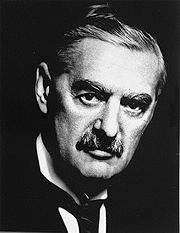 |
Neville Chamberlain (1869–1940) MP for Birmingham Edgbaston |
28 May 1937 |
10 May 1940 |
First Lord of the Treasury & Leader of the House of Commons |
Conservative | [[Fourth National Ministry|4 National]]; Chamberlain War |
[8] | |
| — | ||||||||
| Attempted to maintain "peace for our time" through appeasement of Germany, settling the Munich Agreement; widely criticised following the German Invasion of Poland and consequent outbreak of World War II; resigned after failing to form a Coalition Government. | ||||||||
 |
Winston Churchill (1874–1965) MP for Epping |
10 May 1940 |
23 May 1945 |
First Lord of the Treasury, Minister of Defence & Leader of the House of Commons (1940–42) |
Conservative | Churchill War | [52] | |
| — | ||||||||
| World War II; led a Coalition Government; foundation of the United Nations; proposed what would eventually lead to the European Union; Beveridge Report. | ||||||||
| 23 May 1945 |
26 July 1945 |
First Lord of the Treasury & Minister of Defence |
Conservative | Churchill Caretaker | [53] | |||
| — | ||||||||
| Following the ending of his all-party coalition, Churchill formed a "caretaker" government out of Conservatives, Liberal Nationals and non-party figures. However after two months it was defeated in the 1945 general election. | ||||||||
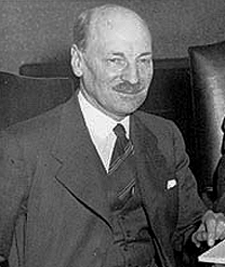 |
Clement Attlee (1883–1967) MP for Limehouse until 1950 MP for Walthamstow West from 1950 |
26 July 1945 |
26 October 1951 |
First Lord of the Treasury & Minister of Defence (1945–46) |
Labour | Attlee | [54] | |
| 1945, 1950 | ||||||||
| Initiated the post-war consensus; introduced nationalisation of utilities; foundation of the National Health Service; extended national insurance scheme; independence of India and the end of the British role in Palestine; foundation of NATO; beginning of the Cold War; the Berlin Blockade and the resulting Berlin Airlift; the start of British involvement in the Korean War. | ||||||||
 |
Sir Winston Churchill (1874–1965) MP for Woodford |
26 October 1951 |
7 April 1955 |
First Lord of the Treasury & Minister of Defence (1951–52) |
Conservative | Churchill III | [55] | |
| 1951 | ||||||||
| Domestic policy interrupted by foreign disputes (Korean War, Operation Ajax, Mau Mau Uprising, Malayan Emergency). | ||||||||
Prime Ministers under Elizabeth II (1952–Present)
| Portrait | Name (Birth–Death) Constituency/Title |
Term of office — Electoral mandates |
Other ministerial offices held while Prime Minister |
Political party of PM |
Government | Refs | ||
|---|---|---|---|---|---|---|---|---|
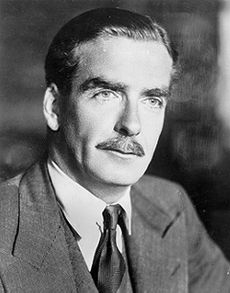 |
Sir Anthony Eden (1897–1977) MP for Warwick and Leamington |
7 April 1955 |
10 January 1957 |
First Lord of the Treasury | Conservative | Eden | [56] | |
| 1955 | ||||||||
| Failed to prevent the Egyptian nationalisation of the Suez Canal; invaded Egypt, leading to the Suez Crisis. | ||||||||
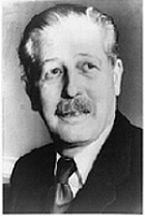 |
Harold Macmillan (1894–1986) MP for Bromley |
10 January 1957 |
19 October 1963 |
First Lord of the Treasury | Conservative | Macmillan | [57] | |
| 1959 | ||||||||
| The UK applied to join the European Economic Community for the first time, the application split the Conservatives and was vetoed by Charles de Gaulle; acceptance of Keynesianism; Rent Act 1957; Wind of Change speech; Notting Hill race riots and New Commonwealth immigration; beginning of Beeching Axe; Night of the Long Knives; Cuban missile crisis; Profumo Affair. | ||||||||
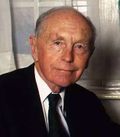 |
Sir Alec Douglas-Home (1903–1995) Earl of Home until 1963 MP for Kinross and Western Perthshire from 1963 |
19 October 1963 |
16 October 1964 |
First Lord of the Treasury | Conservative | Douglas-Home | [58] | |
| — | ||||||||
| Was the Earl of Home when he became Prime Minister, and renounced his peerage on 23 October 1963 in order to stand for the House of Commons. | ||||||||
| Harold Wilson (1916–1995) MP for Huyton |
16 October 1964 |
19 June 1970 |
First Lord of the Treasury & Minister for the Civil Service (1968–70) |
Labour | Wilson I | [59] | ||
| 1964, 1966 | ||||||||
| Social reforms, including legalisation of abortion and decriminalisation of homosexuality; Rhodesian U.D.I.; adopted, then abandoned, the National Plan for the economy; Devaluation of the pound; foundation of the Open University; dispute over In Place of Strife trade union reforms. | ||||||||
| Edward Heath (1916–2005) MP for Bexley |
19 June 1970 |
4 March 1974 |
First Lord of the Treasury & Minister for the Civil Service |
Conservative | Heath | [60] | ||
| 1970 | ||||||||
| U-turned over intervention in industry; negotiated Britain's entry to the European Community; Violence due to Northern Ireland's "Troubles" peaked; the Sunningdale Agreement agreed; Three-Day Week; called early election in backfiring attempt to confront striking miners. | ||||||||
| Harold Wilson (1916–1995) MP for Huyton |
4 March 1974 |
5 April 1976 |
First Lord of the Treasury & Minister for the Civil Service |
Labour | Wilson II | [61] | ||
| Feb.1974†, Oct.1974 | ||||||||
| †Hung parliament. Ended dispute with miners; Social Contract with trade unions over the economy; Health and Safety at Work Act; Renegotiated terms for EC membership, then 1975 referendum validated entry; North Sea oil; Cod War. | ||||||||
| James Callaghan (1912–2005) MP for Cardiff South East |
5 April 1976 |
4 May 1979 |
First Lord of the Treasury & Minister for the Civil Service |
Labour | Callaghan | [62][63] | ||
| — | ||||||||
| International Monetary Fund loan to support the pound; the Lib-Lab pact; enacted devolution to Scotland and Wales but referendums stopped them; breakdown of relations with trade unions and Winter of Discontent. | ||||||||
 |
Margaret Thatcher (1925– ) MP for Finchley |
4 May 1979 |
28 November 1990 |
First Lord of the Treasury & Minister for the Civil Service |
Conservative | Thatcher | [64][65] | |
| 1979, 1983, 1987 | ||||||||
| First female Prime Minister of the UK. Falklands War; sold council housing to tenants (right to buy); miners' strike 1984–85; privatisation of many previously government-owned industries; decreased the power of trade unions; negotiation of the UK rebate towards the European Community budget; Brighton hotel bombing; Sino-British joint declaration; Anglo-Irish Agreement; Westland Affair; abolition of GLC; Section 28; the "Poll tax"; Lockerbie bombing; the end of the Cold War. | ||||||||
 |
John Major (1943– ) MP for Huntingdon |
28 November 1990 |
2 May 1997 |
First Lord of the Treasury & Minister for the Civil Service |
Conservative | Major | [66][67] | |
| 1992 | ||||||||
| Early 1990s recession; Gulf War; ratification of the Maastricht Treaty and the Maastricht Rebels; forced exit from the European Exchange Rate Mechanism ("Black Wednesday"); the Downing Street Declaration (initiating the Northern Ireland peace process); Privatisation of British Rail;The National Lottery; Citizen's Charter; Sunday Shopping; "Back to Basics" campaign; Cones Hotline; Dangerous Dogs Act. | ||||||||
| Tony Blair (1953– ) MP for Sedgefield |
2 May 1997 |
27 June 2007 |
First Lord of the Treasury & Minister for the Civil Service |
Labour | Blair | [68][69] | ||
| 1997, 2001, 2005 | ||||||||
| Hong Kong handover; Death of Diana, Princess of Wales; Independence for the Bank of England; Ecclestone tobacco controversy; Belfast Agreement; Human Rights Act; devolution to Scotland and Wales; House of Lords Reform; Minimum wage introduced; 1999 NATO bombing of Yugoslavia; Fuel protests; creation of Greater London Authority and Mayoralty of London; 2001 foot and mouth crisis; War in Afghanistan; Iraq War; top-up fees introduced for university tuition; Civil Partnership Act; Constitutional Reform Act; 2005 London bombings; Cash for Honours scandal; Identity Cards Act. | ||||||||
 |
Gordon Brown (1951– ) MP for Kirkcaldy and Cowdenbeath |
27 June 2007 |
11 May 2010 |
First Lord of the Treasury & Minister for the Civil Service |
Labour | Brown | [70] | |
| — | ||||||||
| London car bombs; Glasgow Airport attack; foot-and-mouth outbreak (2007); national floods of 2007; child benefit data misplaced; Donorgate; Northern Rock nationalisation; Treaty of Lisbon; 42 Days detention; 10p Tax rate; Financial crisis of 2007–2010; Parliamentary expenses scandal; arrest of Damian Green; 2009 flu pandemic; national floods of 2009; Chilcot Inquiry. | ||||||||
 |
David Cameron (1966– ) MP for Witney |
11 May 2010 |
Incumbent | First Lord of the Treasury & Minister for the Civil Service |
Conservative | Cameron | [71] | |
| 2010† | ||||||||
| †Hung parliament; leading a coalition government with the Liberal Democrats. U.S. Deepwater Horizon BP oil spill; Bloody Sunday apology; June 2010 "emergency" Budget; leak of Afghanistan War Logs. | ||||||||
See also
- Prime Minister of the United Kingdom
- Historical rankings of Prime Ministers of the United Kingdom
- Records of Prime Ministers of the United Kingdom
- List of Prime Ministers of the United Kingdom by term length
- List of Prime Ministers of the United Kingdom by longevity
- List of Prime Ministers of the United Kingdom by nickname
- William Pulteney, 1st Earl of Bath (sometimes listed as a Prime Minister; held office for 2 days in 1746)
- James Waldegrave, 2nd Earl Waldegrave (sometimes listed as a Prime Minister; held office for 4 days in 1757)
Timelines
- Graphical list of Prime Ministers of the United Kingdom
- Graphical list of Prime Ministers showing birth, death and political career of each Prime Minister from Palmerston to Cameron
References
- ↑ "Government and Opposition roles". Parliament of the United Kingdom. http://www.parliament.uk/about/how/principal/government_opposition.cfm. Retrieved 25 October 2008.
- ↑ "Prime minister". BBC News (British Broadcasting Corporation). 16 October 2008. http://news.bbc.co.uk/1/hi/uk_politics/82559.stm. Retrieved 25 October 2008.
- ↑ "Glossary — Parliamentary Jargon Explained; Prime Minister". Parliament of the United Kingdom. http://www.parliament.uk/about/glossary.cfm?ref=primemi_9901. Retrieved 25 October 2008.
- ↑ Hennessy (2001), pp. 39–40
- ↑ 5.0 5.1 Clarke (1993), p. 266
- ↑ Hennessy (2001), p. 39
- ↑ 7.0 7.1 "Parties and Prime Ministers". BBC News (British Broadcasting Corporation). 19 May 1998. http://news.bbc.co.uk/1/hi/uk_politics/talking_politics/95690.stm. Retrieved 12 October 2008.
- ↑ 8.00 8.01 8.02 8.03 8.04 8.05 8.06 8.07 8.08 8.09 8.10 8.11 8.12 8.13 8.14 8.15 8.16 8.17 8.18 "PMs through history". Telegraph.co.uk (London: Telegraph Media Group). 21 September 2007. http://www.telegraph.co.uk/news/1399627/PMs-through-history.html. Retrieved 16 October 2008.
- ↑ "Leaders of the House; Henry Pelham". Office and Ministers. Office of the Leader of the House of Commons. http://www.commonsleader.gov.uk/OutPut/Page751.asp. Retrieved 16 October 2008.
- ↑ Thomas (2002), pp. 66–94
- ↑ Thomas (2002), pp. 95–124
- ↑ Thomas (2002), pp. 125–147
- ↑ Thomas (2002), pp. 148–196
- ↑ Thomas (2002), pp. 197–218
- ↑ Clarke (1993), pp. 278–279
- ↑ Clarke (1993), p. 281
- ↑ Priestley (2002), p. 62
- ↑ Priestley (2002), p. 65
- ↑ Clarke (1993), pp. 293–294
- ↑ Black (2006), p. 180
- ↑ Anderson (1856), pp. 442–443
- ↑ Black (2006), pp. 180–181
- ↑ Clarke (1993), p. 294
- ↑ Longford (1998), p. 63
- ↑ Longford (1998), pp. 156–157
- ↑ Longford (1998), p. 187
- ↑ Longford (1998), pp. 228–231
- ↑ Longford (1998), p. 232
- ↑ Longford (1998), p. 246
- ↑ Longford (1998), p. 281
- ↑ Longford (1998), p. 282
- ↑ Longford (1998), p. 346
- ↑ Longford (1998), p. 351
- ↑ Longford (1998), p. 353
- ↑ Longford (1998), p. 357
- ↑ Longford (1998), p. 396
- ↑ Longford (1998), p. 433
- ↑ Hunt, William; Poole, Reginald Lane (1907). The Political History of England. Longmans, Green and co.. p. 505.
- ↑ Longford (1998), p. 484
- ↑ Longford (1998), pp. 492–493
- ↑ Longford (1998), pp. 518–519
- ↑ Longford (1998), pp. 527–528
- ↑ Longford (1998), pp. 533–534
- ↑ Rose (1983), pp. 196–198
- ↑ Rose (1983), p. 265
- ↑ Rose (1983), p. 272
- ↑ Rose (1983), p. 326
- ↑ Rose (1983), p. 337
- ↑ Rose (1983), p. 361
- ↑ Rose (1983), pp. 373–374
- ↑ Rose (1983), p. 398
- ↑ Hennessy (2001), p. 179
- ↑ Hennessy (2001), p. 158
- ↑ Hennessy (2001), p. 147
- ↑ Hennessy (2001), p. 178
- ↑ Hennessy (2001), p. 207
- ↑ Hennessy (2001), p. 248
- ↑ Hennessy (2001), p. 272
- ↑ Hennessy (2001), p. 286
- ↑ Hennessy (2001), p. 331
- ↑ Hennessy (2001), p. 357
- ↑ Hennessy (2001), p. 376
- ↑ "Lord Callaghan of Cardiff". The Times (London: Times Newspapers Ltd). 28 March 2005. http://www.timesonline.co.uk/tol/comment/obituaries/article438724.ece. Retrieved 13 October 2008.
- ↑ Hennessy (2001), p. 397
- ↑ Ballantyne, Aileen (5 May 1979). "Crowd's long cold wait for lady of the hour". The Guardian (London: Guardian and Manchester Evening News Ltd). http://www.guardian.co.uk/theguardian/1979/may/05/greatinterviews. Retrieved 13 October 2008.
- ↑ Hennessy (2001), p. 437
- ↑ "'John Major? Who's he?' asks Thatcher". The Independent (Newspaper Publishing PLC). 6 August 1995. http://findarticles.com/p/articles/mi_qn4158/is_19950806/ai_n13998865. Retrieved 13 October 2008.
- ↑ Hennessy (2001), p. 476
- ↑ "The Blair Years: 1997-2007". Telegraph.co.uk (London: Telegraph Media Group). 28 June 2007. http://www.telegraph.co.uk/news/uknews/1555734/The-Blair-Years-1997-2007.html. Retrieved 13 October 2008.
- ↑ Summers, Deborah; Mulholland , Hélène (27 June 2007). "Brown declared prime minister". guardian.co.uk. London: Guardian News & Media. http://www.guardian.co.uk/business/2007/jun/27/politics.labourparty. Retrieved 12 October 2008.
- ↑ "BBC News - David Cameron is UK's new prime minister". news.bbc.co.uk (BBC). http://news.bbc.co.uk/1/hi/uk_politics/election_2010/8675265.stm. Retrieved 11 May 2010.
Bibliography
- Anderson, John (1856). A History of Edinburgh from the Earliest Period to the Completion of the Half Century 1850: With Brief Notices of Eminent Or Remarkable Individuals. A. Fullarton & co. ISBN 9781852855819. http://books.google.co.uk/books?id=FxLjodeZ_9kC. Retrieved 21 October 2008.
- Black, Jeremy (2006). The Hanoverians: The History of a Dynasty. Continuum International Publishing Group. ISBN 1852855819. OCLC 70765876.
- Clarke, John (1993) [1975]. Fraser, Antonia. ed. The Lives Of The Kings And Queens Of England. London: Weidenfeld and Nicolson. ISBN 0297832387. OCLC 257417674.
- Hennessy, Peter (2001) [2000]. The Prime Minister; The Office And Its Holders Since 1945. Penguin Group. ISBN 0140283935. OCLC 47063414.
- Longford, Elizabeth (1998) [1964]. Victoria R.I.. London: Weidenfeld and Nicolson. ISBN 0297841424. OCLC 41510024.
- Priestley, J. B. (2002) [1969]. The Prince of Pleasure and his Regency 1811-20. Penguin Group. ISBN 0141391065. OCLC 59475591.
- Rose, Kenneth (1983). King George V. London: Weidenfeld and Nicolson. ISBN 0297782452. OCLC 9909629.
- Thomas, Peter David Garner (2002). George III: King and Politicians, 1760-1770. Manchester University Press. ISBN 9780719064296. OCLC 50191954.
External links
- Prime Ministers in History from the 10 Downing Street website
|
|||||||||||||||||||
.svg.png)